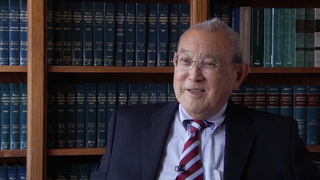Interviews
“Everybody went in like sheep”
Well I said - it was the bitterest experience I ever had. And I think that we should have protested. But I guess that’s why they treated us so good is because we didn’t. Everybody went in like sheep, you know, you didn’t have any…the government had no problem. And I’m sure if they’d have any other ethnic group, they’d really have a fight. I mean - I’m sure that the citizens today would not stand for being in a concentration camp. They’d stand for their rights, but our folks, if…I know…when I told my folks I was so upset that I said I was gonna stand up on the soapbox and I’m gonna do this and…it was all talk, you know. And so, my father told my mother – tell her not to raise, you know, cause trouble. So they, I guess most of the Japanese thought, if the government tells you, you do certain thing, you just do it.
Date: March 31, 2005
Location: California, US
Interviewer: Gwenn M. Jensen
Contributed by: Watase Media Arts Center, Japanese American National Museum
Explore More Videos

Being Denied as a Japanese American Lawyer
(b. 1934) The First Japanese American Appointed to the U.S. Court of Appeals.


Discrimination faced in San Francisco (Japanese)
(b. 1937) A war bride from Yokohama

The riot in Manzanar
(b. 1921) Nisei veteran who served in the occupation of Japan

Father’s Optimism
(b. 1934) Award-winning Disney animation artist who was incarcerated at Topaz during WWII

Tanforan Assembly Center
(b. 1934) Award-winning Disney animation artist who was incarcerated at Topaz during WWII

Father making shell brooches at Topaz
(b. 1934) Award-winning Disney animation artist who was incarcerated at Topaz during WWII

Accepted by Japanese society as I learned more Japanese (Japanese)
(b. 1979) Sansei Nikkei Brazilian who lives in Oizumi-machi in Gunma prefecture. He runs his own design studio.


The lack of discussion about family’s incarceration in Amache
Sansei judge for the Superior Court of Los Angeles County in California

Being Confused about Racial Identity in Postwar United States
(b. 1932) Nisei American stage, film, and TV actress


Understanding anti black racism in high school
(b. 1943) Japanese American transgender attorney

Racial discrimination prepared her in becoming the first transgender trial lawyer
(b. 1943) Japanese American transgender attorney

Foreign language education was severely restricted during the war
Professor of Law, University of Sao Paulo, Lawyer, Translator (b. 1948)
